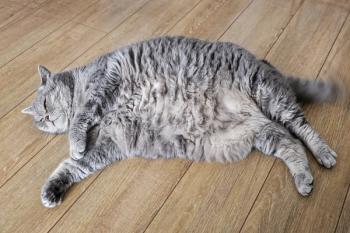
U.S. pets getting fatter, according to pet obesity research report
Pet owners disagree with veterinarians on nutritional issues
Infographic by the Association for Pet Obesity Prevention
Pet obesity in the U.S. continued to steadily increase in 2016, affecting nearly 59 percent of cats and 54 percent of dogs, according to the Association for Pet Obesity Prevention (APOP). During the ninth annual survey, APOP also found that pet owners and veterinary professionals disagreed on key pet food issues such as the benefits of corn and grains, the value of raw and organic diets, and the best sources of pet nutritional advice.
“Obesity continues to be the greatest health threat to dogs and cats,” says APOP founder Ernie Ward, DVM, in an APOP release. “Obesity is a disease that kills millions of pets prematurely, creates immeasurable pain and suffering and costs pet owners tens of millions of dollars in avoidable medical costs.”
In the October 2016 clinical survey, 53.9 percent of dogs and 58.9 percent of cats were classified as overweight (body condition score [BCS] 4) or obese (BCS 5) by their veterinary healthcare professional. That means an estimated 41.9 million dogs and 50.5 million cats are too heavy, based on 2016 pet population projections provided by the American Pet Products Association. In 2015, APOP found that 53.8 percent of dogs and 58.2 percent were overweight or obese.
As part of the 2016 study, pet owners and veterinary professionals were questioned about pet obesity, diet and nutrition, and sources of pet food advice. When asked to classify their own pet's weight, 81 percent of pet owners and 87 percent of veterinary professionals reported that their pets were a normal and healthy weight. Ninety-eight percent of veterinary professionals agreed that pet obesity was a problem in the United States, compared with about 87 percent of pet owners. Nearly all pet owners and veterinary professionals (greater than 95 percent) believed that an overweight pet was at increased risk of pain and suffering and that high-quality nutrition could extend life expectancy.
Quality was the primary influence on pet food purchases for 80 percent of pet owners and 82 percent of veterinary staff. Price (16 percent) or location and convenience (7 percent) were not significant factors for either group when choosing food for their dog or cat. About 55 percent of both pet owners and veterinary professionals said they worried about the quality of their pet's food affecting the long-term health of their dog or cat.
Pet owners and veterinary professionals disagreed on whether their veterinarian discussed their pet's ideal weight. More than 93 percent of pet owners surveyed said they had visited their veterinarian within the past year, yet only 49 percent reported that their veterinarian had discussed their pet's ideal weight during the visit-and more than 60 percent of veterinary professionals claimed they did. Less than 4 percent of pet owners said they felt guilty or uncomfortable when their veterinarian talked about their pet's weight with them.
Only 42 percent of pet owners agreed that their veterinarian should recommend a maintenance diet, compared with more than 64 percent of veterinarians. Only 39 percent of pet owners recalled their veterinary clinic recommending a maintenance diet, while about 48 percent of veterinary professionals said they offered routine diet recommendations.
When asked where they obtained the best dietary recommendations for their pet, more than 46 percent of pet owners rated online advice as the best source, compared with 19 percent of veterinary professionals.
Pet owners and veterinary professionals were sharply divided on pet food ingredients and types of dog and cat diets:
• Do you think low- or no-grain diets are healthier for dogs?
Sixty-one percent of pet owners and 25 percent of veterinary professionals answered “yes” to this statement.
• Do you think raw diets are healthier for dogs and cats?
Thirty-five percent of pet owners and 15 percent of veterinary professionals answered “yes.”
• Do you think organic pet foods are healthier?
Forty-three percent of pet owners and 23 percent of veterinary professionals answered “yes.”
• Do you think corn is healthy for dogs?
Seventy-three percent of pet owners said “no” while 48 percent of veterinary professionals said “yes.”
For the annual obesity prevalence survey conducted by APOP, veterinary practices assessed the body condition scores of every dog and cat patient they saw for a regular wellness exam on a given day in October. Body condition scores based on a five-point scale and actual weight were used in classifying pets as either underweight, thin, ideal, overweight or obese. The 2016 survey included the assessment of 1,224 dogs and 682 cats by 187 veterinary clinics.
Dogs (n=1,224)
BCS
Number of dogs
Percentage
1 6 0.5% 2 17 1.4% 3 542 44.3% 4 417 34.1% 5 242 19.8%
Cats (n=682)
BCS
Number of cats
Percentage
1 7 1% 2 21 3.1% 3 252 37% 4 191 28% 5 211 30.9%
The online questionnaire was completed by 1,172 pet owners and 445 veterinary professionals from October 12 to December 31, 2016. More information about APOP can be found at
Newsletter
From exam room tips to practice management insights, get trusted veterinary news delivered straight to your inbox—subscribe to dvm360.






